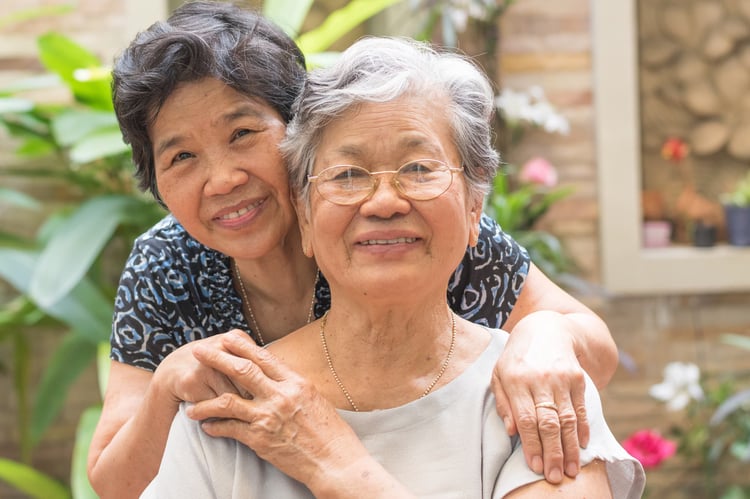
It’s no secret that keeping people with dementia engaged with their surroundings — in terms of both visiting familiar places and exposing them to stimulating situations — is crucial. Yet doing so can be a huge undertaking if the community around them is unaccommodating.
And the challenge is a growing one. Even as we celebrate medical breakthroughs that improve longevity, a growing population of older people means a corresponding increase in memory care. In greater Cincinnati alone, there are more than 30,000 senior citizens. Of these, about 10% of men and 15% of women are likely to develop dementia in their lifetimes.
Tackling Challenges Head-On
In 2020, Marjorie P. Lee’s parent organization, Episcopal Retirement Services (ERS), started the Center for Memory Support and Inclusion to address this growing need. This program ensures that all of ERS’s memory care communities provide comfortable living spaces, exceptional memory support, and individualized cognitive therapies for seniors living with dementia, Alzheimer’s disease, and other cognitive disorders.
The Center also spearheads community outreach programs such as Dementia Inclusive Cincinnati, which aims to make Cincinnati the country’s most dementia-inclusive city by 2025. ERS’s partners in this crucial initiative are the City of Cincinnati and the Alzheimer’s Association of Greater Cincinnati.
Along the way, ERS has learned some powerful lessons about engaging and caring for those with dementia. Not only does Marjorie P. Lee draw from those lessons, but we’re also committed to passing this commitment both to the older adults we serve and to the greater Cincinnati region.
Why Is Dementia Inclusivity So Vital?
People with dementia, as well as their caregivers, don’t live in a bubble. Every day, people in the greater community encounter people with dementia, whether they be coffee shop workers or first responders. In all cases, simple training can make these interactions more positive ones.
Much of dementia inclusivity focuses around training different elements of the community to handle people with dementia with dignity. Areas in which the ERS Center for Memory Support and Inclusion has identified as key areas for dementia inclusivity include:
1. Hospitality & Retail Training
People staffing restaurants, stores, banks and other businesses can be understandably overwhelmed when trying to help those with cognitive loss. Dementia inclusivity training gives those staffers the tools they need to interact with those customers in a friendly, professional manner.
2. First Responder Training
Police and fire personnel learn how to recognize and interact with people with cognitive loss who need emergency services.
3. Integrating Specialized Spaces
Some library branches in greater Cincinnati have developed Memory Cafés in the libraries themselves. These allow for monthly gatherings for activities such as games and music. It’s an idea that could potentially be expanded into other public or commercial entities, such as senior centers.
4. Community Planning
New buildings and those due for reconstruction can implement “wayfinding” systems specifically designed for those with cognitive issues. These provide easily understood signs and maps for people navigating public buildings, health care centers, travel hubs, and even residential spaces.
5. Caregiver Advocacy
Advocates engage with businesses and government agencies to help them understand the loss of income and emotional stress that family members and other caregivers often experience as they care for people with dementia.
6. Organizational Action
Every community is unique, with both assets and challenges that impact dementia inclusivity efforts. The Dementia Inclusive Cincinnati initiative, for example, starts by convening a cross-section of community representatives to develop action plans for various dementia inclusivity needs.
Aging services professionals and other health care professionals, government representatives, business leaders, chamber officials, and Alzheimer’s Association representatives all play a part in boosting dementia inclusivity throughout the greater Cincinnati area.
7. Community Outreach
Because it touches so many lives, the challenge of dementia is a cause that is near and dear to many people. For those who want to get involved in boosting dementia inclusivity in their neighborhoods, Dementia Inclusive Cincinnati organizers identified ways for individuals and organizations to get involved. These include training to become a “befriender” for someone with dementia or lending unique expertise to activities that people with dementia enjoy. In addition, pilot programs can help the interested community and business partners develop systems and employee training that promote dementia inclusivity.
Dignity Starts at Home
The Marjorie P. Lee retirement community includes extensive options in terms of memory care households and services. Along with specially-designed apartments, our residents enjoy trained medical and support staff for customized care.
The services offered at Marjorie P. Lee are prime examples of dementia inclusivity. They include individualized therapies, such as SAIDO, a memory care intervention strategy that is a non-pharmaceutical method of stimulating the prefrontal cortex.
In addition, residents have access to a range of music, art, and horticultural therapies. “360 Wellbeing” provides a range of therapeutic physical activities and services from massage to yoga and chair aerobics.
If you’d like to learn more about options offered by the Marjorie P. Lee retirement community or about the challenges — and solutions — specific to people with dementia and their caregivers, contact us.












